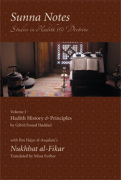
Disse bøkene gir en solid innføring i hadith-kunnskapen. Hvilken regler og prinsipper som legges i grunn for å kvalifisiere hadithene til ulike kategorier som mutawatir, sahih, hassan osv.
Bøkene gir en oversikt over arbeidet som allerede er blitt gjort av hadith-imamene, for å sikre at profeten Muhammad ord blir bevart, og gjengitt korrekt.
Nukhbat al-Fikar undervises forøvrig i darse-nizami kurs i Pakistan. (Darse-nizami er kurset som er påkrevd for å kunna bli en "aalim", eller religiøs lærd)
Volume 1: Hadith History & Principles (with Ibn Hajar al-Asqalani's Nukhbat al-Fikar)
It pleased our bountiful Creator to make knowledge of Hadith and its ancillary sciences the exclusive characteristic of Muslim civilization. Alone among the nations that walked the face of the earth, this Umma received and kept this Divine trust together with the Last Testament -the Quran- to pass it on to subsequent generations unchanged with an ever-refined array of disciplines for verification and authentication.
Among those disciplines, Hadith methodology and criticism ensured that nothing alien crept into the pure Prophetic Sunna as conveyed by upright and precise transmitters under the strict perusal of their peers and subsequent experts. When Ibn al-Mubarak was asked about the forged hadiths he replied, "The giant scholars dispose of them!" Then he recited, Lo! We, even We,have revealed the Reminder, and lo! We verily are its Guardian (15:9). Thus he reiterated in the pithiest way that the Prophetic Sunna and authentic Hadith are part and parcel of the Final Revelation - which no Muslim denies!- and that the Lawgiver preserves His Dhikr through the surest human means imaginable.
Volume 2: The Excellent Innovation in the Quran and Hadith (with Ibn Rajab al-Hanbali's The Sunna of the Caliphs)
Nowhere in the field of Islamic jurisprudence is a blatant tampering with the truth felt more than in the redefinition of "Sunna" and "bid'a". The understanding of the pious Salaf such as Imam al-Shafi'i for these terms is arrogantly cast aside. Their crystal-clear distinction: "Bid'a is of two kinds: praiseworthy innovation and blameworthy innovation" is being abandoned, while in their place. later, controversial figures are invoked as "more representative of the Salaf".
Newfangled theories worm their way into the discourse on right and wrong and -even worse- entire generations of Muslims have been weaned on these perversions of the truth and go into the world parroting the terms "Sunna" and "bid'a" without ever understanding them. Choice victims for this campaign of disinformation in our time are English-speaking Muslims, especially new Muslims. They learn a few expressions then, coiffed with their new hat of condemnatory phrases, go out and blast away at other Muslims.
The purpose of this book is to do away once and for all with these perilous misconceptions and to present over 160 proofs for the Sunni understanding of Sunna and bid'a as it was -and continues to be- set forth in classical, moderate, mainstream Islam according to the Sunni Salaf and Khalaf including the Four Schools of Fiqh.
